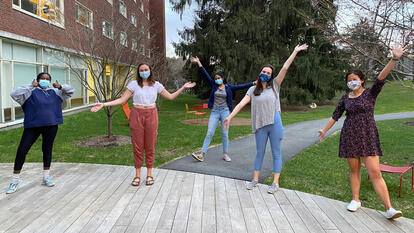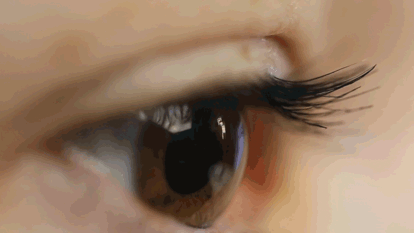Nigerian-Born Visual Artist Finds a New Audience at Wellesley

The Nigerian-born artist Fatimah Tuggar is known for her innovative, multimedia works, in which she uses objects, images, and sounds from diverse cultures and history to convey messages about the impact of technology on different communities.
Tuggar’s work will be featured at the Davis Museum in September 2019. Fatimah Tuggar: Home’s Horizons, her largest solo exhibit to date, will be accompanied by the first monographic catalogue on her work. The exhibition will offer commentary on human interactions with technology and the home.
Recently, Tuggar’s artwork was the special focus of a faculty/staff seminar series at Wellesley, “Art, Race, Gender, and Technology,” led by Amanda Gilvin, assistant curator at the Davis, and funded by the Andy Warhol Foundation for the Visual Arts.
“Her interrogations of how race, gender, and consumerism function on a global scale seemed ideal for the kinds of interdisciplinary learning that the Davis Museum fosters,” said Gilvin, who said she has long admired Tuggar’s work. “Tuggar's work addresses subjects that include economic inequality, race, gender norms, commodity chains, and the climate.”
The series drew faculty from a diverse range of disciplines at Wellesley including economics, Africana studies, intercultural education, philosophy, computer science, and Library and Technology Services. Tuggar, an Associate Professor at the Kansas City Art Institute, also attended two of the seminars, which will convene for its final session on Friday, December 7.
Seminar participants could “plan innovative events that would take place in their classrooms when the exhibit arrives on campus,” said Gilvin.
“Fatima Tuggar’s art brings into question comparisons of old versus new in the context of efficiency, effectiveness, and productivity,” said Tracey Cameron, assistant dean of intercultural education and director of Harambee House, who plans to host a teach-in when the exhibit opens. “I am most intrigued by notions of cultural preservation and cultural appropriation that her work invokes.”
Erich Matthes, assistant professor of philosophy, said Tuggar’s work relates to themes he discusses with his students in Philosophy of Art.
“Her focus on indigo dyeing challenges traditional distinctions between ‘art’ and ‘craft’ as well as invites us to reflect on how we can successfully preserve and document vulnerable practices,” said Matthes. “Her work offers the possibility for students to connect theory with practice, and thus to see the relevance and importance of the philosophical questions we explore in the course.”
Ama Baafra Abeberese, assistant professor of economics, said Tuggar’s work is relevant to her discussions on the effect of technological change on trade in developing countries. “The indigo dye industry in Kano, Nigeria, provides an interesting case study for these topics,” said Abeberese. “The rendition of this industry through Fatimah’s exhibit will help root our discussion in reality for students.”
Photo: Faculty and staff at the Art, Race, Gender and Technology seminar, led by Amanda Gilvin. The seminar is one of a series in advance of Fatimah Tuggar: Home's Horizons, which will open at the Davis Museum in September 2019.
From L-R: Jordan Tynes (manager of scholarly innovations, Wellesley LTS), Amanda Gilvin (assistant curator, Davis Museum), Fatimah Tuggar (associate professor, Kansas City Art Institute), Ama Baafra Abeberese (assistant professor, Economics at Wellesley), Carrie Cushman (Linda Wyatt Gruber '77 Curatorial Fellow in Photography, Davis Museum)



